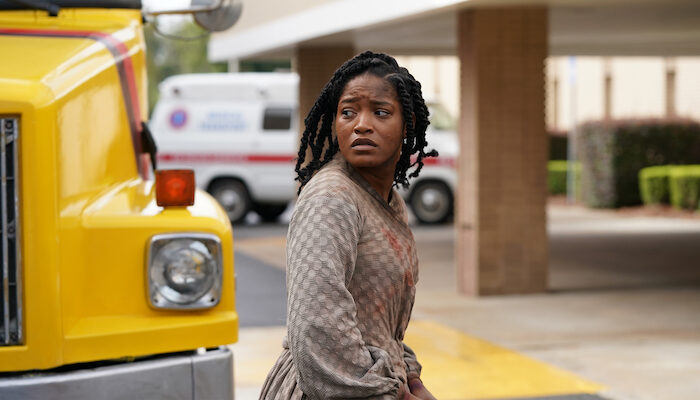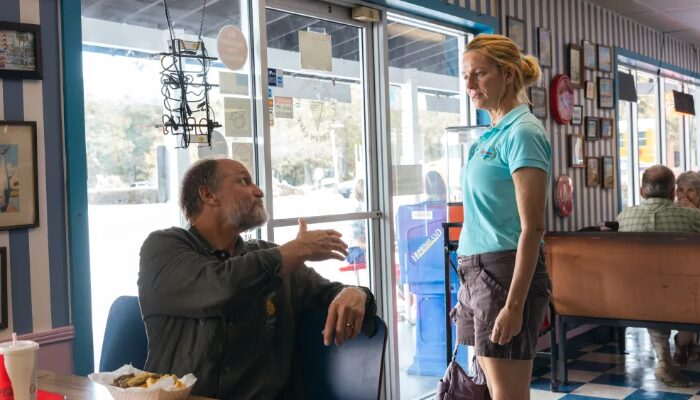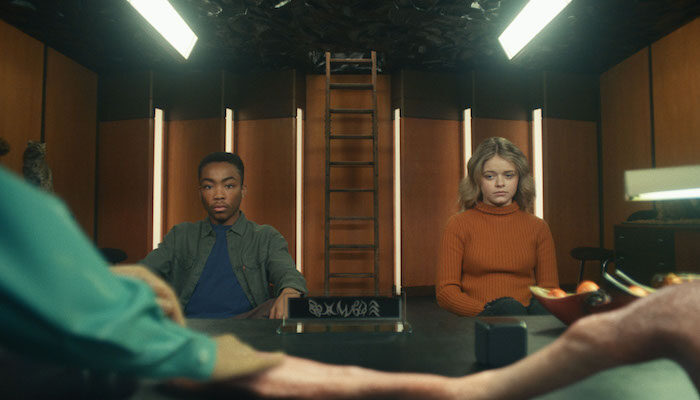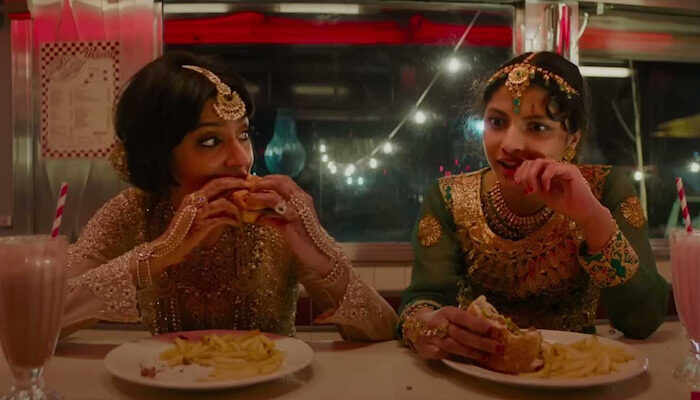Film Review: ALICE: Keke Palmer Shines in Middling Modern-Day Slavery Drama [Sundance 2022]

Alice Review
Alice (2022) Film Review from the 45th Annual Sundance Film Festival, a movie written and directed by Krystin Ver Linden, starring Keke Palmer, Jonny Lee Miller, Alicia Witt, Gaius Charles, Common, Katie Gill, Craig Stark, Sharonne Lanier, Shiquita James, Kenneth Farmer, David Andrew Nash, Natasha Yvette Williams, Durrell Lyons, Janet L. Burns, Jaxon Goldenberg, Madelon Curtis, Eddie King, and Jim McKeny.
Opening on a plantation in antebellum Georgia, Alice (Keke Palmer) is a slave to the cruel landowner Paul Bennet (Jonny Lee Miller), a man who attacks other slaves at random and regularly sexually assaults her. She retreats into books and stories to help ease the pain of her daily life, reading both for herself and aloud for the others – including her secret husband Joseph (Gaius Charles) and his father Moses (Kenneth Farmer). Moses also tells stories, usually tall tales of otherworldly sightings – such as another Black man parachuting out of the sky. These trigger Joseph to seek out their truth and, if they hold credence, to eventually escape the plantation. But Paul soon catches wind of these explorations as well as his marriage to Alice, and after he fatally reprimands Joseph, Alice takes off from the plantation as quickly as she can. She runs for miles until she stumbles across something very strange: a roadway more solid than the dirt ones she’s used to, carrying strange self-powered metal machines – including a really big one with Frank (Common) inside that almost runs over her.
Shaken and nervous about this unrecognizable land (not to mention seeing other Black people doing things on their own without the attendance of white “masters”), Alice timidly accepts assistance from Frank – which in turn also allows her a narrow escape from being admitted to the psych ward. With Frank’s patience and some time to herself to explore, Alice slowly takes in everything that this “new” world has to offer: primarily, the fact that it’s actually 1973, and that although slavery is officially over there still exists vast amounts of racism and disenfranchisement for Black people throughout the United States. Enlightened and enraged, Alice takes after her newfound icon(s) of Pam Grier and the illustrious role of Coffy, ready to go back to Paul’s plantation and dole out some much-needed justice – regardless of Frank’s tepid response to her newfound activism.
To director Krystin Ver Linden’s credit, Alice treads a fine line of solemnity with very little sensationalism. It’s clear from the get-go (i.e. its brief synopsis in the Sundance program) that it’s not (misleadingly?) setting itself up as genre-bending fare based around a shocking twist. Sure, when Alice escapes the plantation and comes across a modern interstate highway for the first time in her life it’s definitely a startling moment, but the film’s thematic weight is not contingent on this singular reveal. Rather, it’s simply a moment of cultural whiplash that we as the viewers are feeling right alongside Alice, and justly empathizing with her as a result (not to mention the fact that she nearly got ran over by a semi-truck, which I’d assume would be shocking to just about anyone coming from any type of situation). Ver Linden continues with that straightforwardness throughout the film, never letting herself get pulled down to the level of exploitative fascination by her subject matter’s weight.
That being said, Alice’s choice to bring in levity sure is an odd one. To be clear: Ver Linden’s script never diminishes the reality of twentieth-century slavery via comic relief, but the fish-out-of-water quirks that the film is awash in during its middle act plays … too lightly, even in those moments used to relieve the story’s emotional duress. Alice’s discoveries of modernity play all too blasé, and that cheapens the ultimate blow.
With memorabilia at Frank’s place Alice gives herself a crash course on American history and becomes politically radicalized, with a particular long take letting Palmer’s talent shine as she experiences an entire psychological breakdown sprawled out amidst newspaper clippings and dozens of books on the living room floor. But that’s the problem: this single shot contains the emotional development worthy of flexing at feature length, yet Ver Linden siphons it off and bookends it with stylistic genre riffs. The rushed third act also gives Alice’s transformation short shrift, which makes its analysis of America’s prolonged penchant for structural racism sort of pedestrian and – whether unintentionally or not, what with pitting a now “woke” Alice against the downtrodden former revolutionary Frank – condescendingly suggests radical politics is only for the naïve. (Then again, Frank’s sense of ethical direction is so convoluted in this final act that you wonder if those critics of Promising Young Woman’s ending will attack this one with equal fervor.)
The result is a film that knows what it wants to say but doesn’t really know what to do with it. Alice offers cathartic thrills as it hits the necessary plot points, yet it still feels incomplete – which is a true shame, because Palmer is at the top of her game as she covers Alice’s extremes with a tempered but rough resilience, and you hate seeing a performance like that underutilized by its encompassing film. Common is surprisingly well-cast, too, as his normal stoic delivery appropriately aides the despondent Frank.
In the end Ver Linden shows promise with her style and technical craft but seems to have trouble finding her voice. Thankfully, at the very least, Alice has found hers.
Rating: 6/10
Leave your thoughts on this Alice review and the film below in the comments section. Readers seeking to support this type of content can visit our Patreon Page and become one of FilmBook’s patrons. Readers seeking more Sundance Film Festival news can visit our Sundance Film Festival Page, our Film Festival Page, and our Film Festival Facebook Page. Readers seeking more film reviews can visit our Movie Review Page, our Movie Review Twitter Page, and our Movie Review Facebook Page. Want up-to-the-minute notifications? FilmBook staff members publish articles by Email, Twitter, Facebook, Instagram, Tumblr, Pinterest, Reddit, and Flipboard.
Related Articles
FilmBook's Newsletter
Subscribe to FilmBook’s Daily Newsletter for the latest news!












